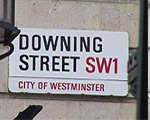 Go to main content
Go to main content
Archive Website of the UK government
Please note that this website has a UK government accesskeys system.
Main menu
Page menu
Government, citizens and rights

Political parties

The party system is based on political groups with their own policies, which compete for the support of the public to win power. In Parliament, the two parties with the most Members of Parliament (MPs) form the government and the opposition.
About political parties
A political party is an organised group of people who have similar ideas about how the country should be run. Their aim is to get their candidates elected to political power.
After a general election, the party with the most MPs usually forms the new government. The second largest party becomes the official opposition, with its own leader and 'shadow cabinet'.
Most candidates in elections, and almost all winning candidates, belong to one of the main parties. If an MP doesn't have a political party, they are known as an 'Independent'.
History of the party system
The system of political parties has existed since at least the 18th century. It evolved from the historical division of Whigs and Tories in the Stuart period. For the past 150 years, Britain has had a mainly two-party system, in which two parties dominate although there may be other parties.
Since 1945, either the Conservative Party or the Labour Party has held power. The Liberal Democrats, the third biggest party in the UK, were formed when the Liberal Party merged with the Social Democratic Party in 1988.
Political parties represented at Parliament
The UK has a wide range of political parties, including national parties in Scotland, Wales and Northern Ireland. The following parties have members in the House of Commons or the House of Lords:
- Labour Party
- Conservative Party
- Liberal Democrat
- Scottish National Party (SNP)
- Plaid Cymru - the Party of Wales
- Democratic Unionist Party (DUP)
- Sinn Féin
- Social Democratic and Labour Party (SDLP)
- Ulster Unionist Party (UUP)
- Respect
- UK Independence Party (UKIP)
- Independent Labour
- Independent Conservative
Many more parties compete in elections. You can access the full register of political parties on the Electoral Commission website.
The role of political parties in Parliament
The effectiveness of the party system in Parliament relies on the relationship between the government and the opposition parties.
The opposition parties contribute to policy and legislation through constructive criticism, oppose government proposals that they disagree with, and put forward their own policies to improve their chances of winning the next general election.
Leaders of the government and opposition sit opposite each other on the front benches in the debating chamber of the House of Commons. Their supporters, called the 'backbenchers', sit behind them.
There are similar seating arrangements in the House of Lords, but peers who don't wish to be associated with any political party choose to sit on the 'crossbenches'.
Chief Whips
The government Chief Whips in the Commons and the Lords, in consultation with their opposition counterparts, arrange the scheduling of government business. Collectively, the Chief Whips are often referred to as 'the usual channels' when the question of finding time for a particular item of business is being discussed.
The Chief Whips and their assistants, who are usually chosen by the party leaders, manage their parliamentary parties. Their duties include keeping members informed of forthcoming parliamentary business, maintaining the party's voting strength by ensuring that members attend important debates, and passing on to the party leadership the opinions of backbench members.
Party funding
The Political Parties, Elections and Referendums Act 2000 aims to make party funding more open. It specifies that:
-
parties can only accept donations of over £500 from 'permissible donors', who are individuals on the UK electoral register, registered companies incorporated in the EU which do business in the UK, registered political parties, or trade unions
-
all donations of over £7,500 to a political party's central organisation must be reported to the Electoral Commission on a quarterly basis, or weekly during a general election campaign
-
organisations or individuals who campaign but don't stand for election (like trade unions) must register with the Electoral Commission if they spend more than specific limits on campaigns. In England, the limit is £10,000. In Scotland, Wales or Northern Ireland the limit is £5,000
-
all donations of over £1,500 to 'accounting units', like a constituency association, must be reported to the Electoral Commission
Donations to elected representatives
Individual MPs and other people elected to office (including MEPs, members of the devolved assemblies of Wales and Northern Ireland and the Scottish Parliament, members of local authorities and the Mayor of London) are subject to similar controls on the source of donations:
- MPs must record any donations made from 'permissible donors' in the House of Commons' Register of Members Interests
- MPs must report any donations from anyone other than 'permissible donors' to the Electoral Commission.
- other elected representatives have to report to the Electoral Commission any donations over £1,500
General election spending
Political parties are subject to a cap on campaign spending before a general election:
-
a party has an allowance of £30,000 for each constituency contested
-
alternatively, parties can spend up to £810,000 across England, £120,000 across Scotland and £60,000 across Wales if this amount is greater
The date of the 2010 general election meant that the campaign spending cap overlapped with the cap for the European elections. This meant that there was a combined limit for both campaigns.
 Facebook
Facebook Twitter
Twitter StumbleUpon
StumbleUpon Delicious
Delicious Reddit
Reddit

